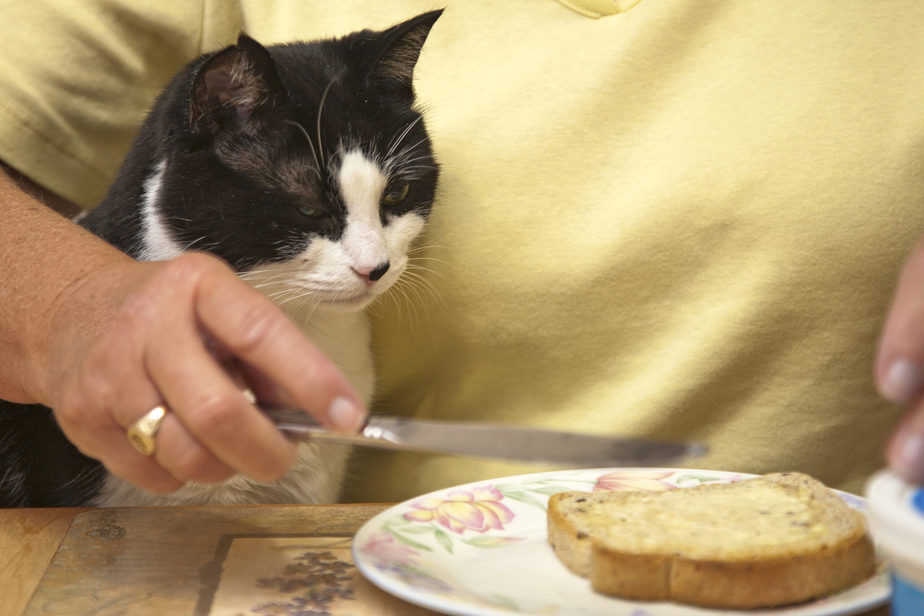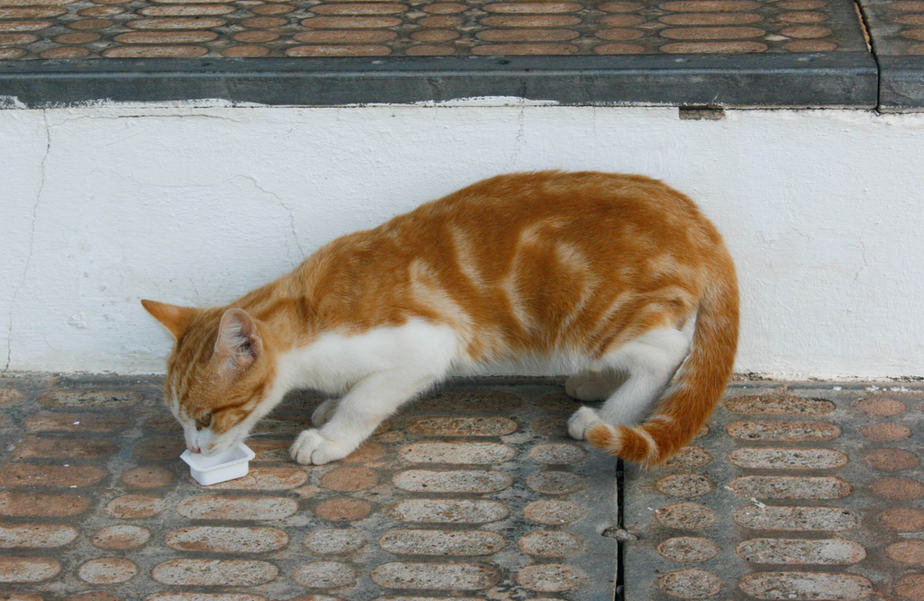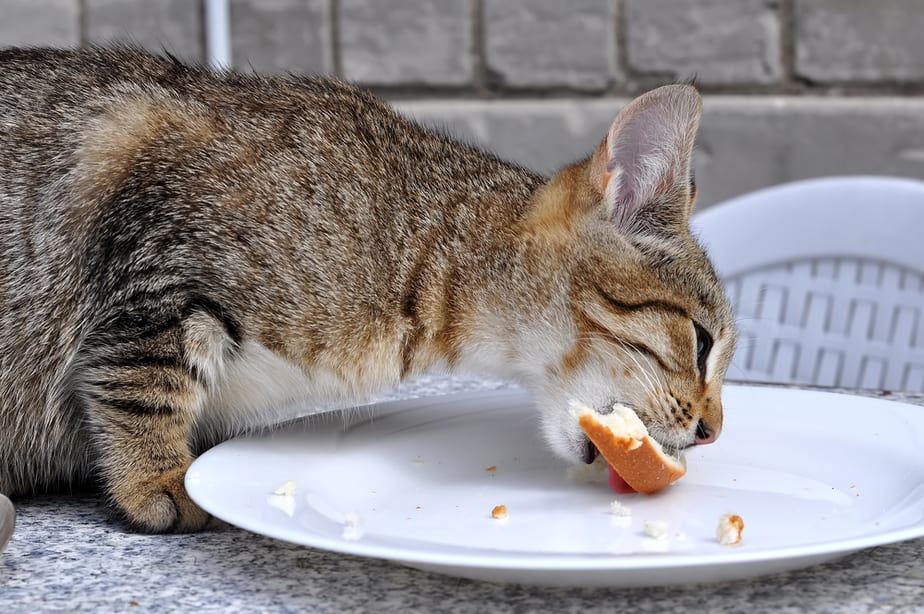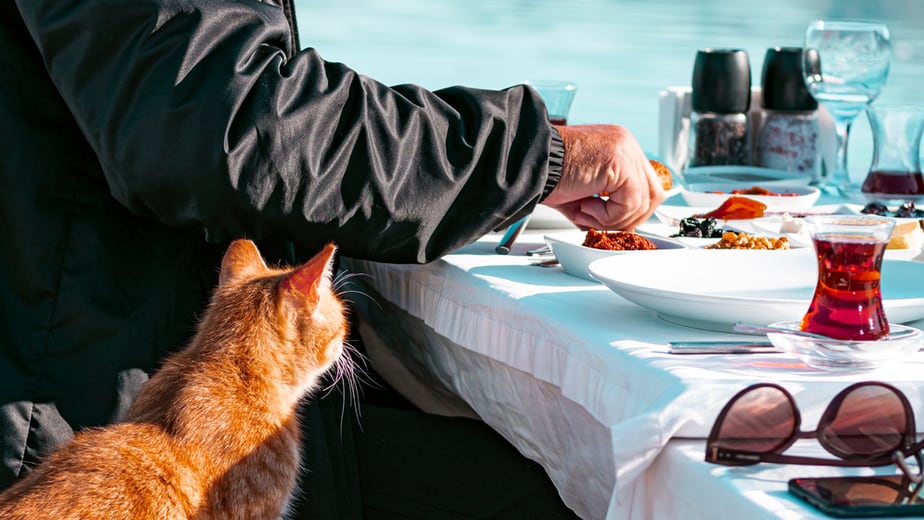📖 Table of Content:
Butter is an ingredient that goes well with so many foods. Also, cats are creatures that stuff their noses in lots of food. These two facts make us wonder, can cats eat butter?
This fatty, creamy ingredient has widespread use in the kitchen. It’s used as a spread, in baking goods like pastries, and many other dishes, sweet or salty.
We can say it’s a common denominator for many dishes. Cats, being the chefs they are, always want to supervise our cooking skills. This includes tasting foods while we wait for their approval.
However, some boundaries need to be set in the kitchen. Even if your pet is a supervisor, she shouldn’t put her whiskers in your bowls all the time.
Is butter bad for cats?
To be honest, yes. Cats can eat butter, but will probably have some side effects. Felines are built differently than humans and therefore, require a special diet that sometimes doesn’t cross paths with ours.
What serves a great purpose in our kitchen could be of no use to our pets, or even harmful. Sadly, butter is one of those ingredients that shouldn’t be on your furry chef’s list. Components found in butter, such as dairy, salt, fats, and others, are all troublesome for cats.
These items could awake that jungle in your pet’s tummy and make it rumble! This isn’t the ideal situation, especially if your furkid isn’t fast enough to get to the litterbox…
Dairy content and cats: how do they get along?
Butter is considered dairy as it’s a by-product of milk. The way butter is made presents the answer to the question “Can cats eat butter?” It’s produced when the cream has separated from the milk and been churned.
The next steps include adding salt to it, so the large percentage of butter is made up of milk fat and sodium. These are unhealthy to cats in so many ways.
Dairy isn’t welcomed in the feline world. The reason behind this is that cats are lactose intolerant.
Just like some humans, your pet could get the runs if she consumes butter or milk. Just like is the case with sour cream, a few licks here and there aren’t likely to cause her harm. Still, there’s no reason to encourage her to try it.
Cats lack the enzyme called lactase that helps break down the sugar found in milk – lactose. A bit confusing, right? While the terms may blur your mind, the message is crystal clear: no dairy for your furkid.
Some pets won’t show signs of lactose intolerance even after eating a good chunk of butter, whereas others start immediately after having a bite. The symptoms of lactose intolerance are expressed in vomiting, diarrhea, bloating, and gassiness.
These can be troublesome for both you and your kitty cat. (Been there, done that.)
Dairy allergies in cats
Lactose intolerance and dairy allergy may have similar symptoms but are not the same thing. Lactose intolerance in cats happens due to the lack of an enzyme, while dairy allergy is a body’s abnormal response to it.
The symptoms vary from one cat to another, but some common ones include rashes, itchy skin, as well as wheezing and digestive issues. Some symptoms can be tricky to distinguish intolerance from an allergic reaction, such as gastrointestinal upset.
Another key difference is that lactose intolerance develops when kittens stop breastfeeding and an allergy is something your cat can be born with or develop later in life. Either way, don’t be so keen on finding out what’s the case with your cat. A healthy pet means lower vet bills!
Can cats eat butter because of the salt?
Ah, what’s better than seasoning your food with some sea salt or regular salt? It really adds to the flavor and can change up the whole meal! Salt has the power to make bland foods finger-licking! Especially if you’re in love with it, like I am…
But once again, it’s a different story when it comes to our furry friends. Butter generally contains high amounts of salt and isn’t recommended for feline consumption.
Sodium is a mineral that’s required for a balanced diet in both humans and their four-legged companions. It helps with muscle and nerve functions and aids in balancing fluids. This flavoring agent also occurs naturally in many foods through which your pet benefits.
Your cat gets enough of this mineral through a healthy and balanced diet, which means any additional amounts are unnecessary. This ingredient can be detrimental to your pet’s health if consumed in large quantities or for prolonged periods. It’s been linked to high blood pressure, which brings with it a higher risk of stroke and heart disease.
However, this isn’t your main concern if your cat chef eats butter regularly. Salt toxicity may occur if she’s exposed to and has regular access to this mineral. The symptoms of salt poisoning in felines include vomiting, diarrhea, excessive thirst, and urination, as well as dehydration.
In severe cases, if your cat decides it would be a good idea to feast on salt (which is unlikely to happen), the poisoning could induce seizures, tremors, and even coma.
High-fat content
As we mentioned before, butter is loaded with fats. Butter is made up of 80% milk fat.
This is probably what could get your pet intrigued because fat is essential to them. However, these fats aren’t the healthy ones and your pet should avoid them as far as possible.
The natural fats found in meat and other fresh foods are a great energy source for your cat. They provide her with fuel that supports her daily activities and helps keep her warm when fur isn’t enough.
However, fats found in butter are highly saturated and, trust me, you don’t want to feed your feline these. Saturated fats are known for raising bad cholesterol levels in the blood, which is associated with the onset of heart diseases and stroke. If you want to keep your feline healthy and fit, you’ll skip the butter.
So, in short, cats can technically eat butter, but it’s not highly recommended.
A small percent of the overall fat content in butter is made up of monounsaturated and polyunsaturated fats. These are known for having an opposite impact on your cat’s health rather than saturated ones.
It means that they’re good for lowering the risk of heart diseases. However, the amount of these healthy fats isn’t sufficient to outweigh the negative impacts of saturated fats.
Alternatives to butter
Even if cats can eat small amounts of butter every now and then, you should really turn to substitutes. We have established that butter holds many threats to your cat’s health and your task is to eliminate them.
If you love cooking, you’ll come across butter all the time. And if your pet’s a curious one, she may have her nose up in your business more than you’d love her to. Even though she’s super cute with all the investigation going on, you don’t want to risk her getting sick because of butter.
Still, you don’t want to exclude her from your cooking session, but also make sure that her safety is your number one priority. In this case, you can opt for some almond butter.
It isn’t an ideal replacement, but it doesn’t contain any milk, which is good news. However, the bad news is that it’s still high in fats, so moderation is key.
To sum up
Cats can eat butter, but only if that means a lick or two here and there. It’s a common ingredient found in many dishes and hard to avoid. However, butter is one more reason you shouldn’t inspire your pet to eat human foods.
It doesn’t hold any health benefits to cats and is instead detrimental to their health. The risks of salt poisoning and dairy allergies, together with its high-fat content, just aren’t worth it.
Related post: Can Cats Eat Cottage Cheese? Is It A Safe Treat For Cats?





